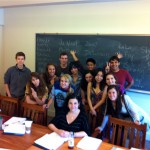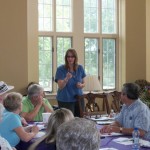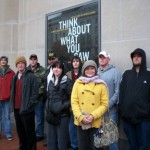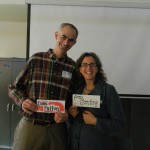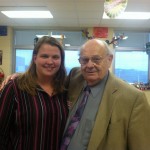Re-Reading Sondra Perl’s *On Austrian Soil”
Forums › 2023 Summer Seminar › On Austrian Soil 2023 Summer Seminar Responses: due MAY 30 › Re-Reading Sondra Perl’s *On Austrian Soil”
-
AuthorPosts
-
-
May 17, 2023 at 8:33 am #31690
With my graduate training in narratology, I always have liked to compare my notes from the first reading of a book to a second. Like the first reading, *On Austrian Soil” brought out a myriad of reactions, both from my educator side and from that of a Catholic raised under Vatican II.
My first post from 2021 was from my educator side and the two quotes I cite still resonate deeply with me:
As someone who has recently begun applying the principles of Universal Design for Learning (UDL) into my teaching, I was delighted to read the following on the bottom of p. 27: “Tonight, too, we will see the presentations by the reading groups. In addition to working on our writing, we have also been reading and responding to “young adult” novels. I have asked each small group to create a presentation that brings the book to life. This light-hearted but serious assignment is designed to show that writing is not the only way to demonstrate an understanding of a text and to experience how other forms of expression-music, art, drama-bring other kinds of intelligence into play.” This passage resonates with me because when teaching French, I remind my students that they are learning to read, write, speak, and understand French and not all four of these skills are acquired at the same rate. Moreover, if for example, one student is strong on paper, another may be strong in speaking (whereby I usually have students work in groups where their respective skills complement one another). Thus, it is imperative to allow students multiple ways to demonstrate their learning in ways that are meaningful and comfortable to them.
As a foreign language educator, I was struck as well by the discussion on p. 41: “‘But how is that possible?’ Margaret stammers, losing her composure. ‘What is it that identifies someone as Jewish?’ I can almost hear the doubt beginning to swell inside her. How can I say such things. … ‘Well, yes,’ she says skeptically. ‘But then there’s language and culture.’ ‘I know it may be artificial, but for a minute, try to put aside the difference in language,’ I say. ‘Think about the way people move. Think about how they express themselves in their bodies, what their faces look like. Don’t you think there are characteristic differences between different groups of people? Say, for example, between Italians and Swedes?’” In foreign language classes, we do not just teach linguistic skills (e.g., how to conjugate a verb) but also interpersonal ones (e.g., how to interact respectfully with someone from the target language culture). This is why it has been so important for me to introduce the lessons of the Holocaust in the world language classroom. While it is impossible to be a perfect speaker of any language (e.g., we all have an accent of some type), we can become better human beings by learning how to dig deep beyond surface layers and stereotypes to appreciate and understand more fully the perspective of someone from another culture with a history that is different from our own.
I finished reading Chapter Five: “Whipped by the Wind” last night and cannot help but think of how precious interactions with people from other cultures is. I pray that we will be able to continue to maintain these types of interactions, from which true friendships are built.
-
May 24, 2023 at 2:41 pm #31714
Thanks for reading and rereading OAS, Eileen. I just returned from my first trip since the pandemic. My partner and I went, not surprisingly, to Innsbruck to spend 10 days with Margret and Gert. A true friendship grew out of that seminar in 1996 and continues til today, something I could not have predicted then and am grateful for today.
-
May 25, 2023 at 12:34 pm #31722
Eileen, thank you for your comments and your commitment to helping your students become better human beings. Your students are indeed blessed to have you. Sondra’s experiences, words, and shared stories are a light in gloomy times.
-
May 29, 2023 at 9:21 am #31728
Eileen, I am delighted that you apply UDLprinciples in your classroom.I am a practioner of the UDL principles as well, and have braided the principles with culturally responsive teaching practices. I suspect UDL is gaining strength in higher education and I hope you influence ithers in yur institution.
-
June 16, 2023 at 5:28 pm #31864
Sondra – So glad that you were able to visit with Margret and Gert. I have always felt that true friendships endure over all obstacles. I think this is truly the case for you and Margret.
Mary – Yes, let’s continue to be inspired by Sondra during these gloomy times. My mother used to always say that “rain is liquid sunshine.” I take it a step further and say “without the rain, one cannot appreciate the sunshine.”
Momodou – Let’s talk UDL when we meet in NYC. Would love to compare strategies with you.
-
-
AuthorPosts
- You must be logged in to reply to this topic.
Recent Replies
Recently Active
-
Active 16 hours, 54 minutes ago
-
Active 17 hours, 53 minutes ago
-
Active 3 days, 17 hours ago
-
Active 4 days, 19 hours ago
-
Active 4 days, 22 hours ago
- View All Members

